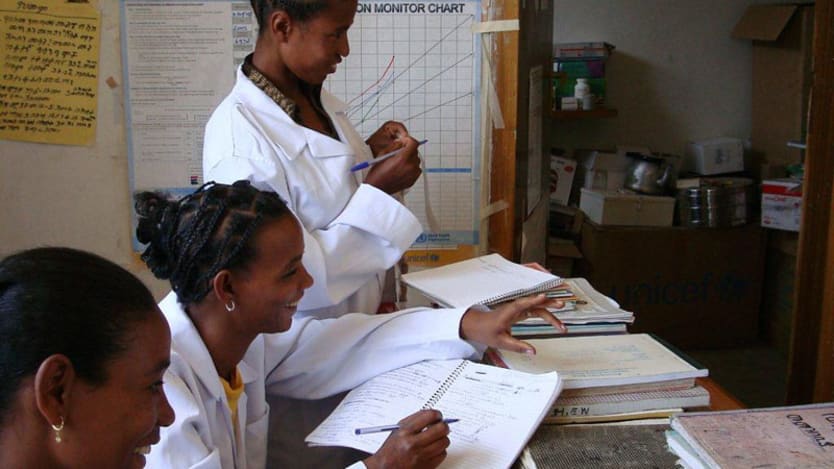
The Sustainable Development Goals have set a series of exacting social, economic and environmental targets for the world’s nations, in order to secure a prosperous future for the generations to come. These goals will require substantial investment, and so last November the United Nations launched the Financial Innovation Platform. The platform aims to help scale up innovative finance solutions to support the achievement of the SDGs.
At the B20 Health Conference in Berlin earlier this month, Devex spoke with several delegates about the types of funding that could help the global health sector in particular to achieve SDG targets.
Dr. Patricia Mechael, executive vice president of the Personal Connected Health Alliance, shared her thoughts about which actors are providing the most effective models of sustainable financing for health care. This must come from a multitude of sources including governments and private sector engagement, said Mechael.
“We are starting to see the stepping up of nontraditional sources of financing. Some of the big investment banks are now starting to get more involved in health,” she said. “I think some of these innovation funds and social impact bonds are interesting to look at, and to track how they’re being applied to health.”
See more stories on Going for Goals:
► This fund seeks a traditional return and grantlike impact for global health R&D
► Innovative financing needed to counter stalled SDG progress
► 3 tips for success in implementing global health projects
► 5 ways to boost cooperation in global health
► Going for Goals: How to innovate on health sector financing
Mechael, who previously served as executive director of the mHealth Alliance and as principal and policy lead for HealthEnabled, went on to say that some of the early results of this results-based financing are promising, and that we are seeing countries really start to make strides in having the data to show, and track where they are able to make progress.
“One of the underlying challenges that we’ve seen is measuring performance, and actually measuring the outcomes,” she said. “This is where I think digital health can really play a significant role, both on the service delivery side but also in improving quality of care, and improving access.”
During the conference, health and well-being company Philips launched its Future Health Index 2017, which examines how digital health technology could help global health systems to be more effective in delivering high-quality care. Devex spoke with Prof. Jan Kimpen, Philips’ chief medical officer, about one of the key themes that emerged from the Index’s research — just as important as making more funds available is the need for greater efficiency in allocating funds.
Here are some highlights from that conversation, edited for clarity and length.
Achieving the 17 SDGs by 2030 is an ambitious target that will require stakeholders from across sectors coming together with a common purpose. What's your advice for building enduring, far-reaching partnerships with financial institutions and enterprises that you're working with on the ground?
Given the enormous challenges that we are facing … [and] the enormous burden on the costs of health care, we came to realize that nobody can do it alone. There is not one company, not one hospital — not one government, most probably — that can say “okay, I can take ownership and do it all by myself.” You have to do it together in an ecosystem where everybody plays their own role.
Until now, there have been a large group of organizations who think “I’m going to solve that problem. Nobody [else] is going to solve that problem.” It’s not going to be a Big Bang, where one day it’s solved; it’s going to be incremental, it’s going to be slower than we would want it to be. But [we] can only progress through collaboration.
One of the collaborations very closely aligned with the SDGs is what we do in primary care in underserved markets. We engaged with the United Nations, with governments, [and] with insurance companies — for example, in Kenya and in the Republic of Congo. We studied the systems there together with our partners and people on the ground, and what you see in these countries is that they have big hospitals — good hospitals — but they have only a few of them. The population at large only trusts these hospitals, so they say “oh, I am sick, I am going to travel for three days to the biggest hospital.” They might die on the way, or they might go there with small problems that don’t need this high-level care.
So what we try to do with the government, together with the people on the ground there, [is] to bring health care close to these communities by making what we call “community life centers.” These centers are containers that are equipped with the most basic materials, and with digital connectivity, and have their own water sources, and can generate their own electricity. And what we have seen in Kenya is that when you put that community life center there, people get to trust that and go there with their small problems … [and] slowly a community gathers around that, because they are completely self-sustaining.
Philips' model community life center in Kenya
How is Philips addressing sustainability issues at its model Community Life Center in Githurai, Kenya? Devex visited the site to find out.
We are deliberating now how to bring that to scale … and you have to have co-ownership for that to work. The government has to pay for it, they have to engage with the idea that this is good to do. You need to have local people in the market there; you have to engage the doctors and the health care workers in the area. So it’s a collaborative action.
It's been said that a new age of business requires new thinking. What does the need for new financing structures and innovative, more agile strategies mean for health care and development in general?
I think everybody feels, and we feel, that new ways of reimbursement and new ways of paying need to be developed. Because if we just keep on doing what we did yesterday, it will be unsustainable. There is no way that we as a system can cope with these enormous amounts of patients who are coming on.
There are 14 million new cases of cancer every year, and that’s going up to 20 million in 2025; one in every three of us is going to get cancer ... New reimbursement models need to be developed. And you see it happening: It’s going from volume-based care to value-based care — not being paid any more for seeing more patients and doing more examinations and more operations, but [instead] how much value you add to the life of a patient. Your reimbursement [as a doctor] will be dependent on that.
What is the next frontier for innovative financing for health and the health-related SDGs — what does Going for Goals really mean in the next few years to set us on the path to success in 2030?
The final frontier will be if we really go to value-based health care, and if we are able to reallocate some of the money to prevention, which is now only a very small amount in comparison [to the total health budget] — less than 2 percent, and all the rest is [spent] on curing the sick. So if we manage to design a system where more resources are devoted to prevention ... we will create a lot of quality, a lot of value, and we will save a lot of money.
Over 10 weeks Devex, along with our partners the European Investment Bank, the International Finance Corporation, Philips, and the United Nations Development Programme, will take an in-depth look at the innovative financing mechanisms driving forward the 2030 sustainable development agenda. We’ll explore how the funding gap can be filled, ask how cross-sector collaboration can lead to improved global health care, and look at what it takes to build successful partnerships for change. Join us as we examine the innovative financing powering the Global Goals by tagging #Going4Goals and @devex.
Search for articles
Most Read
- 1
- 2
- 3
- 4
- 5








